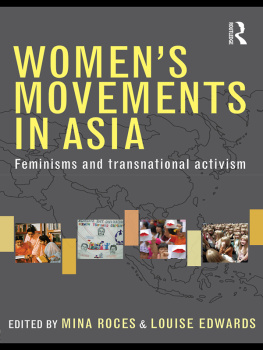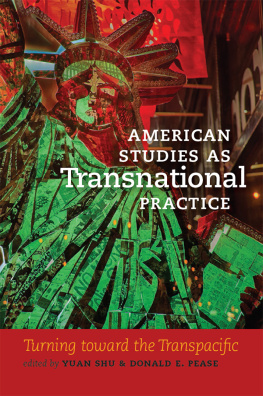STAGING DISSENT
Staging Dissent: Young Women of Color and Transnational Activism seeks to interrupt normative histories of girlhood dominated by North American contexts and Western feminisms to offer an alternative history of girlhoods produced by and through globalization. Weems does this by offering three case studies that exemplify how transnational and Indigenous youth dissent against capitalism and colonialism through situated guerilla pedagogies.
Lisa Weems is an Associate Professor of Curriculum and Cultural Studies and Women, Gender and Sexuality Studies at Miami University in Oxford, Ohio.
STAGING DISSENT
Young Women of Color and Transnational Activism
Lisa Weems
First published 2018
by Routledge
711 Third Avenue, New York, NY 10017
and by Routledge
2 Park Square, Milton Park, Abingdon, Oxon, OX14 4RN
Routledge is an imprint of the Taylor & Francis Group, an informa business
2018 Taylor & Francis
The right of Lisa Weems to be identified as the author of this work has been asserted by her in accordance with sections 77 and 78 of the Copyright, Designs and Patents Act 1988.
All rights reserved. No part of this book may be reprinted or reproduced or utilised in any form or by any electronic, mechanical, or other means, now known or hereafter invented, including photocopying and recording, or in any information storage or retrieval system, without permission in writing from the publishers.
Trademark notice: Product or corporate names may be trademarks or registered trademarks, and are used only for identification and explanation without intent to infringe.
Library of Congress Cataloging in Publication Data
Names: Weems, Lisa D., 1969- author.
Title: Staging dissent : young women of color and transnational activism / Lisa Weems.
Description: New York, NY : Routledge, 2017.
Identifiers: LCCN 2017031067 | ISBN 9781138210660 (hardcover : alk. paper) | ISBN 9781138210677 (pbk. : alk. paper) | ISBN 9781315454771 (ebook)
Subjects: LCSH: Feminism. | Feminist theory. | Young women--Political activity. | Minority women--Political activity. | Resistance (Philosophy)
Classification: LCC HQ1155 .W465 2017 | DDC 305.42--dc23
LC record available at https://lccn.loc.gov/2017031067
ISBN: 978-1-138-21066-0 (hbk)
ISBN: 978-1-138-21067-7 (pbk)
ISBN: 978-1-315-45477-1 (ebk)
To the young women of color and Indigenous women whose ideas, actions and stories animate this book. They serve as sources of inspiration, provocation, sustained engagement and radical hope; and to my mother.
This book is the culmination of thoughts, conversations, research and activity that spans ten years. With that in mind, there are an undoubtedly dozens of persons who have greatly contributed to the making of the project. I sincerely apologize if I forget to name anyone specifically. I organize this list of persons to acknowledge in a loose chronological order in which they have appeared in my life and thinking though clearly some folks have remained crucial supports along the way.
First and foremost, I would like to give a shout out to the Feminist Collective at the Womens Resource Center where I literally came of age at University of Nebraska Lincoln. The people in that group introduced me to the praxis of woman of color scholarship, art, collaboration and consensus as a form of decision-making. It was there that I became aware of the classic text This Bridge Called My Back and its imminent critique of mainstream feminism. I was fortunate to have scholars who supported my interest in blending scholarship and activism through the creation of an individualized degree that focused on feminisms of color, culture and education. Key among this group is Teresita Aguilar, Maureen Honey and Joyce Joyce who took time to share their knowledge of Gloria Anzalda, Zora Neale Hurston and bell hooks as artists and writers and the implications for teaching and learning. Helen Moore was crucial for introducing me to the field of feminist sociology and education and encouraged me to pursue graduate education.
I met Patti at a hotel bar in Omaha, Nebraska. (Sounds like a line to a good country western song, huh?) I remember that she reminded me of Barbara Hammer, the experimental filmmaker. Patti strongly recommended that I apply to the Masters in Sociology program in order to be assured financial assistance. For doctoral work, she hoped she could piece something together for me. I am grateful to Patti Lather for so many things, but this particular comment made me realize that she understood the material conditions in addition to intellectual work necessary to complete a Ph.D.. Had she not recommended I complete my M.S. in Sociology, I would not have the good fortune to study with Verta Taylor and Laurel Richardson-two prominent qualitative researchers and feminist scholars. Laurel Richardson was particularly supportive of my creative, auto-ethnographic and poetic writing. Moreover, I now understand how difficult it must have been to work in a department that fundamentally does not understand the scholarship that one produces or validate ones way of thinking. I am so thankful for my time with Clyde Franklin, III, whose embodied scholarship on gay Black masculinities paved the road for many contemporary innovative ways of thinking, yet his modesty and generosity means that his name and contribution do not receive the due respect and recognition they deserve. His life and also left a radical impression on my thinking about place in the academy for bodies who simply dont fit. Though his body left this earth entirely too early, he never complained; instead he boldly provided nurturance and leadership for our little band of deviants and misfits.
During my Masters degree program, I had the opportunity to work at Fan the Flames, one of the last surviving independent bookstores. It was the kind of feminist bookstore that you see portrayed in the1990s cartoon series Dykes to Watch Out For by Alison Bechdel or those currently parodied in IFC series Portlandia. I am so thankful to have that experience because it represents the danger of any dogmatic adherence to any particular ideology (such as cultural or radical feminism). Though the term TERF (trans exclusionary radical feminist) was not in wide circulation back then, there were certainly strong opinions about the superiority and naturalness of women with a y"; the policing of boys, men, and even transwomen; and a general disinclination against sex toys and sex work. However, we were fortunate to bring the amazing writers Chrystos, Minnie Bruce Pratt and Elizabeth Lapovsky Kennedy among others who made it clear that there is space for gender and sexual diversity as well as sex-positive practices within the feminist movement or ethnic community even if it wasnt popular. Despite its limits, I still see myself within this space of multiracial, queer, socialist, anti-racist, and anti-colonial organizing, coalition-building and kinship.
Mary Leach was critical to my discipline as a scholar. I appreciate Marys insight about the dangers of self-promotion and theoretical hero worship in academia. Her insistence that we read the classic texts in foundations of education, coupled with utilizing original historical sources turned me on to incorporating archival research.









